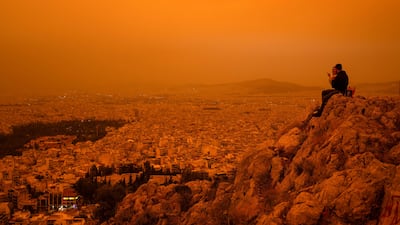Skies over southern Greece turned orange on Tuesday as dust clouds blown from North Africa covered Athens' landmarks.
Strong southerly winds carried dust from the Sahara resulting in the orange hue, and have also stirred up wildfires in the country's south.
A low-pressure system over northern Africa swept dust over Cyprus several times in mid-April, “darkening skies and reducing air quality,” Nasa said.
The Greek meteorological service said weather on Tuesday had favoured the movement of dust from Africa and this was showing up in “increased concentrations in the atmosphere,” particularly in the south of the country.
Daily peak temperatures in parts of the southern island of Crete topped 30 degrees Celsius, more than 20 degrees higher than what was registered in much of northern Greece.
The fire service said on Tuesday evening that 25 wildfires broke out across the country in the past 24 hours. Three people were arrested on the Aegean Sea resort island of Paros on suspicion of accidentally starting a scrub blaze on Monday, it added. No significant damage or injuries were reported, and the fire was quickly contained.
Another blaze that broke out on Crete near a naval base was brought under control on Tuesday.
The skies are predicted to clear on Wednesday, as winds shift and move the dust, with temperatures dipping.

































The eastern Mediterranean country of Cyprus has also been affected by the dust.
Greece suffers devastating, and often deadly, forest blazes every summer, and last year the country recorded the European Union's largest wildfire in more than two decades. The destructive blaze destroyed 378,381 hectares of land – more than double the predicted damage.
EU spokesman Balazs Ujvari said at the time that it was “the largest in the EU since 2000, when the European Forest Fire Information System began recording data”.
Global warming has helped fuel larger and more destructive blazes. The 2023 wildfires caused huge economic disruption in key holiday regions, such as Rhodes and Crete.
The wildfires have cost Europe an estimated €4.1 billion ($4.43 billion) so far in 2023, fuelled by extreme heat that has seared the Mediterranean from Greece to Spain.
Persistent drought, combined with high spring temperatures, has raised fears of an upcoming challenging period for firefighters this summer.









